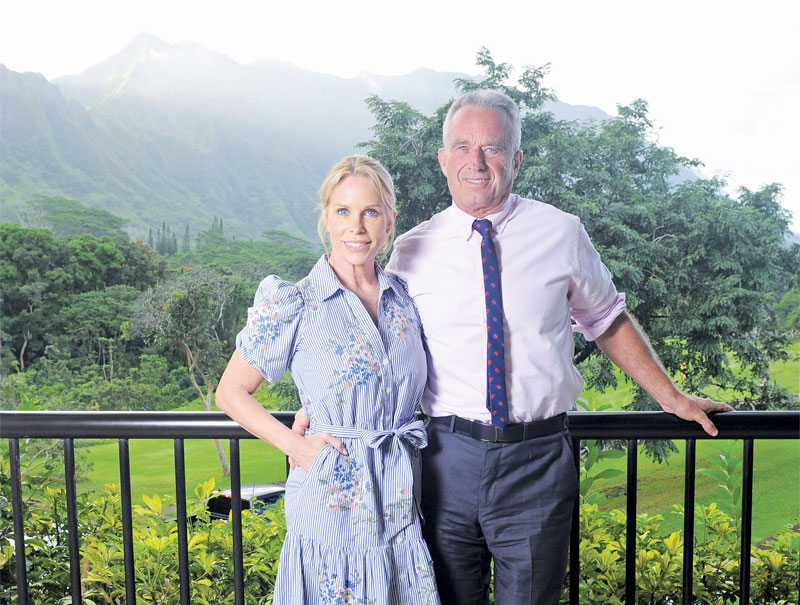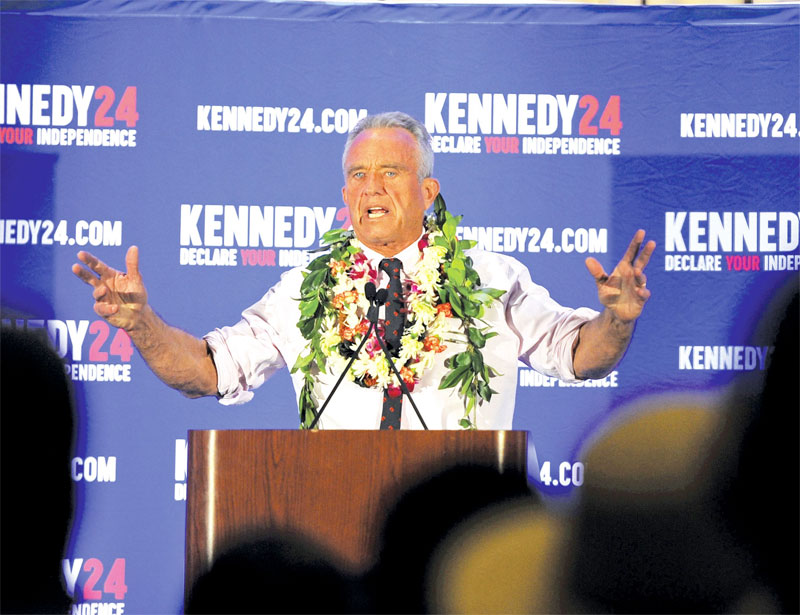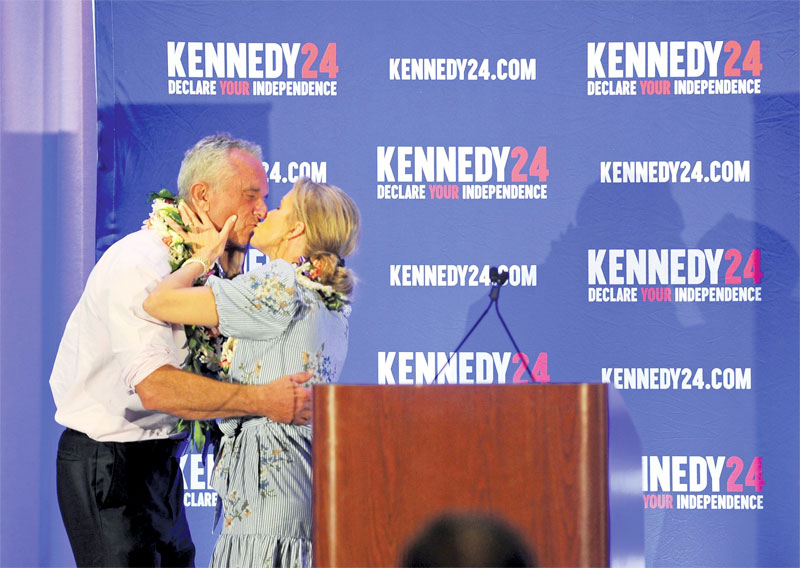Independent’s Day

Is Robert F. Kennedy Jr., the longtime Democrat-turned-independent presidential candidate, the next leader of the free world? He and his team, which includes wife and actress Cheryl Hines, certainly believe so.
If ever there were a household of American political royalty, it would have to be the Kennedys. Over the last three generations, this highly influential family has given the country a president, an attorney general and a couple of senators — not to mention the enduring yet mythologized notion about John F. Kennedy’s time in the White House that’s still whimsically referred to as Camelot.
Now comes the son of former U.S. Attorney General and U.S. Sen. Robert F. Kennedy and the nephew of JFK, environmental lawyer Robert F. Kennedy Jr., who has declared his candidacy for the highest office in the land. In tossing his hat into the presidential ring, Kennedy not only becomes the fifth member of the dynastic family to run for the country’s top job, but also the hope of tens of thousands, maybe even tens of millions, that this Kennedy would finally be able to chart a new course forward for the country.
This Kennedy, however, is not like the others. For one thing, he’s been a lightning rod for controversy with accusations of peddling anti-vaccine misinformation and various conspiracy theories, including his insistence that the CIA was behind the assassination of his uncle.
For another, he isn’t running as a Democrat — long the party of his family. Rather, he’s having to make his way as an independent.
To his growing base of supporters — independents as well as the disaffected from either side of the political aisle — Kennedy is viewed as the sensible alternative to another Joseph R. Biden Jr. or Donald J. Trump presidency.
And yet he faces an uphill climb. His first challenge as an independent candidate is to get on the ballots of 50 states and the District of Columbia. So far, he’s only qualifed in Utah.
To deal with this, Kennedy and his team touched down in the islands last week as part of a grassroots effort to get on Hawai‘i’s ballot. By deploying scores of volunteers, Kennedy and his team are aiming to gather the necessary number of signatures to challenge Trump, Biden or whoever else happens to be there in November.
Not to worry, says the man who once fought agribusiness giant Monsanto and won a $289 million lawsuit against it for intentionally concealing the health risks of its Roundup products, and who relishes overcoming any obstacle placed in his way. In fact, he insists it won’t be difficult gathering the necessary number of signatures.
“There’s a rule in Hawai‘i and five other states that if you form a political party, the number of signatures is much reduced. So we formed a political party here in Hawai‘i, already approved by the secretary of state, and it’s called ‘We The People,’” says Kennedy, adding the other five states are California, Delaware, Mississippi, North Carolina and Texas. “We only need 861 signatures, but we’re going to get 1,400 because we’re going to push it and we’ll have those by Feb. 8.”
MidWeek sat down with the presidential candidate just prior to his Jan. 18 voter rally at Ko‘olau Ballroom/Convention Center in Kāne‘ohe and asked him several questions regarding his bid to be the 47th president of the United States, his outlook for the country, his overall health and his all-too-brief visit to the islands.
MW: You celebrated your 70th birthday just the other day (Jan. 17). How did you spend the occasion?
RFK Jr.: Well, I did surfing with (professional surfer) Kelly Slater and I did a shark dive and scuba diving on the North Shore, too. We also did a jump from a helicopter; we were only about 40 feet up. My son did a backflip, but I chickened out on the backflip at the last minute.
MW: Even at age 70, you have the body of a 40-year-old man. What’s the secret to staying strong and fit?
RFK Jr.: What I do is I hike every day. Then, I go to the gym for 35-40 minutes. I also do intermittent fasting. Basically, I try not to eat before noon and after 7 p.m.
MW: You also had a strong and vibrant voice for much of your life before you developed spasmodic dysphonia, a condition that causes your vocal muscles to spasm. When exactly did this happen and do you believe your voice has improved since?
RFK Jr.: I got it in my early 40s. It’s a neurological injury and so there’s nothing wrong with my throat, but my brain is telling my vocal cords to tighten up. I’m doing a bunch of treatments for it now and it’s improved enormously.
As bad as my voice sounds, it sounded a lot worse before. I’m hoping it will continue to improve. With a lot of people, it’s hard to listen to me; I can’t even listen to myself. If I hear myself following an interview, I’ll say, “Turn it off!”
MW: What’s one reason Hawai‘i residents should consider you as Commander in Chief?
RFK Jr.: I’d like to get Americans into homes and end the homelessness epidemic. Hawai‘i has the worst rate of homelessness of any place in the country, and the principal reason for it is housing prices. A lot of people think it’s mental illness or drug addiction, but the biggest correlation is housing prices. The average home cost in this state is $980,000; the average in the continental U.S. is about $400,000.
We need to make housing available to people — it’s important in sustaining the middle class that people can own homes. It’s also critical for our democracy. Thomas Jefferson said that American democracy is rooted in the widespread ownership of land by tens of thousands of independent freedom holders, each with a stake in our system. We’re going now from being an ownership society to being a rental society and when we do that, we go from being citizens to being subjects.
MW: In breaking with the Democratic Party, do you feel you were forced into that decision? Or, was life as an independent something that was inevitable?
RFK Jr.: It was very difficult for me. I was the last person on my campaign to come to that place. Dennis Kucinich, who was managing my campaign from the beginning, told me, “They’re never going to let you win; they’re going to fix it.” And I didn’t really believe it. My wife, Cheryl, did not really want me to leave the party. But even before I came to the conclusion, she came to the conclusion that they were fixing it so that we couldn’t win. They changed the rules so that even if I won every vote in New Hampshire, for example, President Biden would get 100% of the delegates. And then they started getting rid of entire primaries. So ultimately, it just became clear.

Robert F. Kennedy Jr. addresses several hundred supporters and members of the media during a Jan. 18 rally at Ko‘olau Ballrooms/Convention Center in Kāne‘ohe.
MW: Some say you’re running as an independent just to play the role of spoiler. Are you?
RFK Jr.: No, I would not be running to make that point. I’m running to win.
MW: What is your vision for America? If you believe it’s veered off course, how do you right the ship and correct its trajectory?
RFK Jr.: My highest priorities are restoring the middle class in this country, unraveling the 800 military bases that we have abroad, ending the forever wars, investing in our communities, ending the chronic disease epidemic that has exposed so many Americans to toxic foods, toxic medicines, and toxins in our water and in the air; ending the border crisis by sealing the border and not allowing the Mexican drug cartels to run America’s border policy; and fixing the education system by giving more school choice and more reliance on charter schools, but also rewarding the public schools that work.
The environment has also been my top issue for my whole life, so obviously that would be one of my top priorities.
MW: What would your first orders of business be should you win the White House?
RFK Jr.: The first thing I’m going to do is to focus on free speech. On day one, I’m going to issue an executive order prohibiting any federal official from colluding with media or social media in the censorship of the American people. I’m also going to restore the prohibition on the CIA engaging in propaganda against Americans, and I’m going to pardon Julian Assange and Edward Snowden.
Then I’m going to go down to NIH (National Institutes of Health) and focus it so that instead of developing and incubating new drugs for the pharmaceutical industry, they’ll have to explain to the American people what’s causing the food allergy epidemic. Why do kids now have peanut allergies when they didn’t when I was a kid? Why do they have autoimmune diseases? Where is rheumatoid arthritis, juvenile diabetes and where are all these neurological development disabilities coming from?
Autism has gone from 1 in 10,000 in my generation to 1 in 34 in my kids’ generation. What’s causing it? And what’s causing the obesity epidemic? They’re all caused by toxins. Genes don’t cause epidemics; you need environmental exposure. We also need to identify why this generation of kids is the sickest generation in history.
Why isn’t NIH answering these questions? We’re going to answer them and then eliminate the exposures, the same as I did with Monsanto when I sued them.
MW: You’ve been accused of being a conspiracy theorist. Why do you think many have been so quick to saddle you with that label?
RFK Jr.: For most of my life, I argued that PCOS (polycystic ovary syndrome) were endocrine disruptors and that glyphosate was causing cancer and people would call it a conspiracy theory. But then I win a case in court proving it and it’s no longer a conspiracy theory. Just the other week, Francis Collins (NIH director) and Anthony Fauci (former director of National Institute of Allergy and Infectious Diseases) testified before Congress saying that yeah, maybe the COVID pandemic did come from the Wuhan lab, and yet that’s been a conspiracy theory.
I think anything that you say that challenges corporate profit taking by large corporations and the agencies that they captured, they’ll try to brand you as a conspiracy theorist. All these things begin as conspiracy theories if you say anything against government orthodoxies or corporate profit taking.
So, instead of meeting the argument, it’s their way of discrediting the messenger.
MW: You were asked earlier what you’d do if you captured the presidency. But what if you aren’t victorious? Would you be open to joining the cabinet of the elected president?
RFK Jr.: I intend to win. I don’t have a Plan B.





